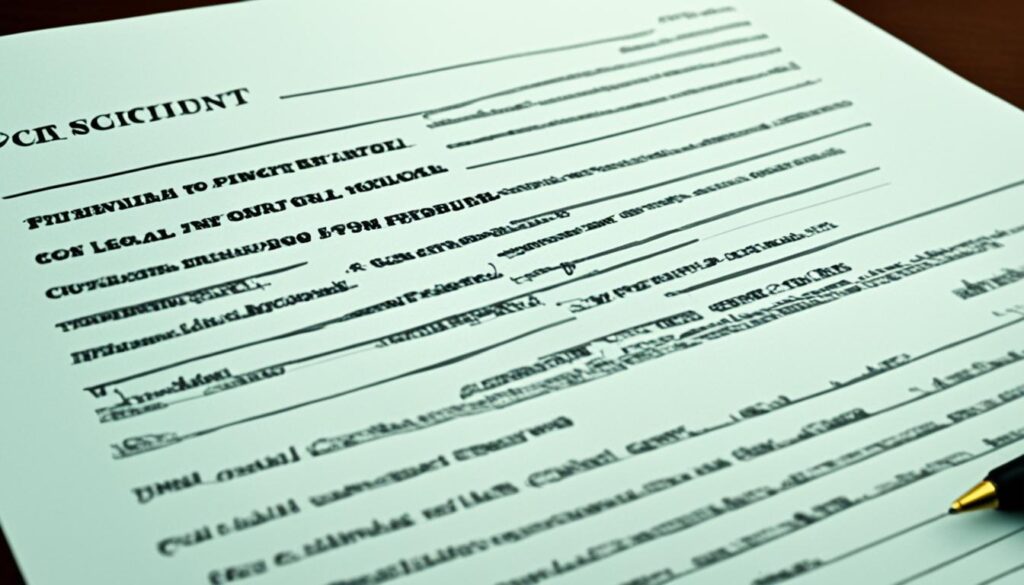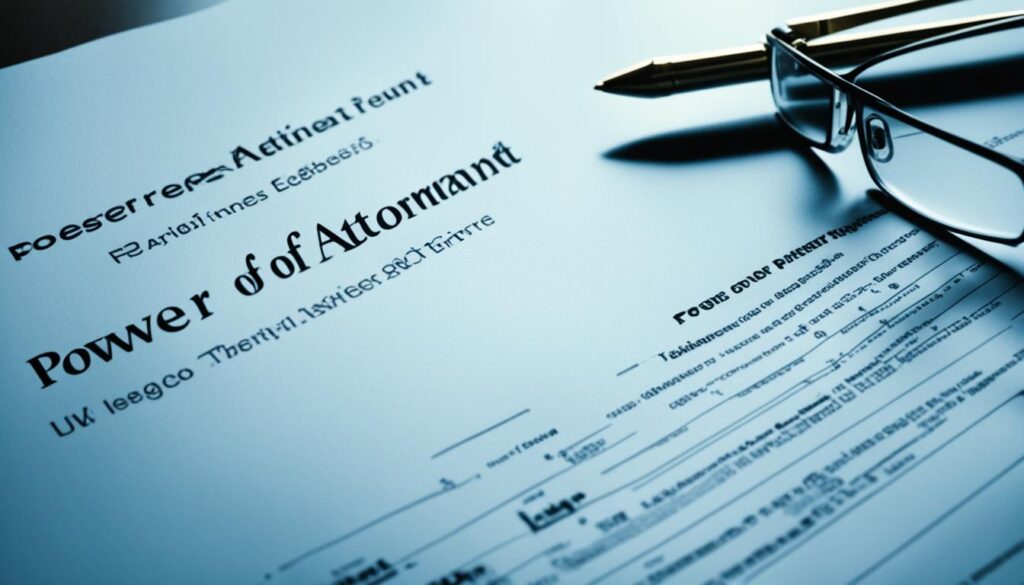As an adult, you want to help your parents stay well. But, sometimes their finances and legal matters get hard to handle. That’s when getting power of attorney can really help. It means someone else can make decisions for your parent. This can be a professional who understands the law and finances well.
Key Takeaways
- Power of attorney can help adult children manage their elderly parents’ financial and legal affairs.
- The parent must be of sound mind and understand the implications to grant financial decision-making authority.
- Seeking legal assistance is advised if a parent is already incapacitated without a power of attorney in place.
- Different types of power of attorney exist, each serving specific purposes and limitations.
- A durable general power of attorney can ensure decision-making continuity for an elderly parent.
Understanding Power of Attorney for Elderly Parents
As parents get older, knowing the importance of power of attorney is key. This legal document lets someone you trust make decisions for another, if their health prevents them from doing so. For elderly parents, it lets the chosen person handle healthcare, finances, and more.
What is Power of Attorney?
A power of attorney is a legal way for your parents to pick someone to manage their matters. This person, called the agent, can take care of finances, property, or health decisions for the parent.
Types of Power of Attorney
There are many kinds of power of attorney to fit your parents’ needs:
- General Power of Attorney: This gives the agent large powers to handle the parent’s finances, legal matters, and more.
- Durable Power of Attorney: It stays effective even if the parent becomes unable to make decisions, ensuring a smooth process.
- Limited Power of Attorney: For specific tasks, like handling a single financial issue or property, the agent gets power.
- Medical Power of Attorney: This allows someone to make health choices for the parent, including at the end of life.
The choice of power of attorney type depends on your parents’ needs and what the law allows in your area.
“Without a power of attorney in place, if a parent becomes incapacitated, the adult child would have to go through a complex and possibly costly legal process for guardianship or conservatorship.”
Setting up power of attorney early avoids problems and reduces worry. It makes sure that when health problems happen, things go smoothly for everyone.
When Do Elderly Parents Need Power of Attorney?

As our parents get older, they might need help with their money and personal business. A power of attorney can help keep them safe and look after their needs. It’s important to know when to think about getting one for your mom or dad.
You might think about getting a power of attorney if your parent is beginning to forget things or make decisions slowly. This could be because of dementia, Alzheimer’s, or other conditions. With a power of attorney, you can make sure their money is managed well and their needs are taken care of as their mind gets weaker.
If your parent has a big medical event coming up, a power of attorney could be very helpful. This includes times like needing to go to the hospital, or for end-of-life care. With this legal power, you can help make sure things go smoothly for them.
Sometimes, even if your parent is still pretty sharp, managing money might become hard for them. A power of attorney can be helpful then. It ensures their bills get paid and their money is looked after, even if they find it challenging to keep up with new financial technology.
Deciding on a power of attorney for your parent is a big choice and depends on their situation. It’s key to talk openly with them about your concerns. And, working with a good lawyer will make sure everything is done right and legally.
“The power of attorney document in New York must be signed by the principal in the presence of a notary public and two adult witnesses.”
Choosing the Right Power of Attorney Agent
https://www.youtube.com/watch?v=Jcln6x5MUfg
Choosing the right power of attorney (PoA) agent for an elderly parent means looking at many options. The agent must be at least 18 years old and mentally fit. This person will make important decisions for your parent. So, picking someone you trust completely is key.
Who Can Be Power of Attorney?
For elderly parents, picking a PoA is flexible, but certain rules apply. They need to be over 18 and fully capable. The chosen PoA is someone the elder trusts to look after their best interests. Usually, family members are chosen. Yet, discussing the best choice openly is wise. The main person can also name backups, in case the first choice can’t act anymore.
Considerations for Selecting an Agent
When picking a power of attorney agent, consider their money skills, when they’re free, and if they make sound decisions. Look for someone reliable, truthful, and organized. They must be ready to take on this duty. Being able to get along and communicate well helps avoid family issues. These are critical points to make the power of attorney role work smoothly.
It’s a good idea to have other agents ready in case the main one can’t continue. This approach ensures your parent’s needs are always met. It gives your parent peace of mind, knowing trusted people can step in.
“The consequences of appointing incompetent or untrustworthy agents under powers of attorney may result in financial abuse, improper health care, family conflict, and other negative outcomes.”
Steps to Obtain Power of Attorney for a Parent

For a caring child, getting power of attorney (POA) for your aging parent is key. It ensures their safety and financial stability. With POA, you make decisions for them when they can’t. The process seems tough, but learning the steps is important. It helps ensure your parent’s best interests are looked after.
Decide on the Type of POA Needed
To start, pick the right POA for your parent. Think about their needs:
- Durable POA: Keeps working if your parent can’t make decisions themselves. This keeps their care and finances going.
- General POA: It lets you manage many legal and financial issues for your parent.
- Limited POA: If you need control over just one thing, like selling a house or managing a bank account.
- Medical POA: This type is for healthcare decisions if your parent can’t decide on their own.
Think about what your parent needs now and in the future. Then, choose the right POA type for them.
Complete and Sign the POA Form
After choosing the POA type, you will need to fill out some forms. You can find these forms online or get them from a doctor. Make sure to follow all the directions. Include all the needed info. Both you and your parent must sign in front of a witness who also signs to make it official.
Once the form is complete, keep copies and store the original safely. This will help you carry out your POA responsibility when needed.
| Type of POA | Description | Key Considerations |
|---|---|---|
| Durable POA | Remains in effect even if the parent becomes incapacitated | Provides continuous care and financial management |
| General POA | Grants broad powers to handle a wide range of legal and financial matters | Offers maximum flexibility in managing the parent’s affairs |
| Limited POA | Grants authority over a specific asset or transaction | May be more suitable for certain situations, such as managing a single bank account |
| Medical POA | Allows you to make healthcare decisions for your parent if they are unable to do so themselves | Ensures your parent’s medical wishes are respected |
Getting POA for a parent involves many steps. Understanding the different types and processes is crucial. It protects your parent’s interests and health. Always feel free to ask legal or financial advisors for help if needed.
Responsibilities of a Power of Attorney Agent
Being a power of attorney agent means taking on a lot for your elder parent. You manage their money and make health choices for them. It takes a lot of time and you need to know what you’re doing.
Financial Responsibilities
When it comes to money, you handle a lot. This includes paying bills, setting a budget, and managing how money comes in and goes out. You deal with taxes and keep track of retirement money. Don’t forget, you might need to work with lawyers and accountants.
Healthcare Decisions
For health, you make sure your parent gets the right care and help them make tough choices about the end of their life. You also deal with any decisions about organ donation. This job needs someone with time and know-how to look after their parent’s health needs.
To be a good agent, you must really know about financial management and healthcare decision-making. This duty is a big deal and impacts your parent’s health and money.
“The power of attorney agent acts as a fiduciary, meaning they have a legal obligation to act in the best interests of the parent, not their own.”
Understanding what you need to do as an agent is key to help your parent well. It can be tough, but with knowledge and help, you can do a great job.
Legal Requirements for Power of Attorney in Your State

The rules for making a power of attorney (POA) can change a lot by state. In California, a POA is valid with two witnesses. They must see your parent sign the paper and also sign it themselves. Or, a notary public can notarize the POA for you.
It’s key to know your state’s laws to make sure the POA will hold up in court. If you don’t do things the right way, the POA might not count. This could make things hard for your parent and their affairs.
Understanding California’s Power of Attorney Requirements
California offers many POA forms, like Durable, General, and Medical. But whatever the type, you need to fill the forms correctly and have them notarized.
Getting help from experts, including fiduciaries, is smart. They can manage your parent’s financial tasks and protect them from fraud. California mainly uses four POA types: Durable, General, Limited, and Medical.
| Power of Attorney Type | Description |
|---|---|
| Durable Power of Attorney | Remains in effect even if the principal becomes incapacitated |
| General Power of Attorney | Grants broad authority to the agent to handle the principal’s affairs |
| Limited Power of Attorney | Grants specific, limited powers to the agent, such as for a single transaction |
| Medical Power of Attorney | Allows the agent to make healthcare decisions on behalf of the principal |
Speaking with experts like The Law Office of David W. Foley in San Diego is wise. They can guide you on the kind of POA that fits your situation and California’s needs.
Talking to Your Parents About Power of Attorney
Discussing power of attorney with your aging parents can be touchy. They may worry about losing independence. It’s key to be caring and understanding. This helps keep them safe and in control.
Tell your parents that you want to assist in planning for the future. You’re not looking to take their choices away. Let them know power of attorney helps keep them independent. It doesn’t mean losing their ability to decide.
Talk about the various types of power of attorney, like General Power of Attorney and Medical Power of Attorney. Pick what’s best together. Keep it simple so they grasp the process easily.
“Planning ahead is essential for avoiding rushed decisions, especially in cases of sudden incapacitation,” says Christina Jeter, Esq.
Starting this conversation early can make things easier for everyone. Show them how it’s best to plan for what’s ahead. This can ensure their wishes are honored and their needs met correctly.
Always respect their independence during this process. Let them know their thoughts matter most. Suggest they get advice from experts to help with deciding.
The topic of power of attorney might be challenging for your parents. Be understanding and patient. Focus on what’s best for them. This can make the conversation go more smoothly.
How to Get Power of Attorney Over a Parent

Getting power of attorney (POA) for your parent is vital for their well-being and financial health as they get older. It involves several important steps that you must think through carefully. By knowing the different POA types and how to go about it, you can safeguard your parent’s future.
The first thing to do is talk openly with your parent. This discussion helps pick the right POA type for them, like durable or medical POA. After choosing, you’re ready to start the needed paperwork.
- Start by collecting the right forms. The exact paperwork varies by state, so use your state’s official site for these documents.
- Next, fill in the POA form with detailed and correct information. Make sure you understand what powers the agent will have.
- Then, your parent must sign the form with two witnesses around. In some places, it might need to be notarized. Always verify the local rules.
Working with an attorney is a smart move when getting POA. They make sure everything follows the law and suggest the best steps. Also, their help cuts down on possible future problems with the POA.
“Getting POA for a parent might be tough, but the right prep can make sure your parent’s wishes are respected.”
By carefully following these steps and seeking advice from a legal pro, you can smoothly obtain POA. This key role can give you peace of mind and help handle any hurdles as time goes on.
Handling Disagreements Among Agents
When you pick more than one agent for your parent’s power of attorney, it’s vital to plan for any possible fights. All agents should smoothly work together. They need to act in the best interests of the principal. If they can’t agree, important decisions might get delayed, causing trouble.
To prevent disagreements, clear communication and roles are key. Set a process for solving disputes. Getting advice from a lawyer can help too.
Strategies for Resolving Disagreements
- Open and clear communication is important. Regular talks help address concerns and find common ground.
- Make sure each agent knows their specific duties. Clear roles can stop conflicts between them.
- Have a method for solving arguments. Choose mediation or arbitration to handle big disagreements.
- Talking to a lawyer is smart. They can offer legal advice. They’ll also ensure the power of attorney document is set up to avoid disputes.
- Think about having co-agents or changing agents. This can split up the decision-making to avoid major conflicts.
By thinking ahead about potential agent disagreements, you can make sure your parent’s care is smooth. This keeps the decision-making process strong and effective.
| Common Factors in Deciding Who to Name as POA | Challenges with Co-Agents |
|---|---|
|
|
“Proactively addressing the potential for disagreements among power of attorney agents is crucial to ensure your parent’s needs are met and the decision-making process remains efficient and effective.”
Revoking or Updating a Power of Attorney

At some point, your parent may need to revoke or update their power of attorney (POA). They might need to change the agent or the original agent can’t do their job anymore. It’s important to know the legal steps to make sure the POA is valid.
To revoke a POA, your parent must fill out some paperwork and tell the agent. They also need to give copies of the revocation to places like banks or hospitals. If the POA can’t be revoked, your parent will need a court order if they aren’t capable of making decisions.
Updating a POA is similar. Your parent can pick a new agent and update the documents. They can change who the agent is or change the rules of the original POA. Revoking and updating are the main ways to change or stop a POA.
If there’s a problem with the POA – like if someone is taking advantage or there’s a disagreement – it might need to be revoked. In these cases, family can ask a court to look into things. It’s very important to do things the right legal way when making these changes.
| Revocation of Power of Attorney | Updating Power of Attorney |
|---|---|
|
|
The POA can’t be passed on by an agent, only by the person they’re helping. That person can choose new helpers for when they can’t do it anymore. Also, if that person dies, the POA ends and the will’s executor takes over.
Revoking or updating a POA is tricky but crucial to protect your parent’s interests. By working with experts and following the right steps, you can handle these changes well.
Working with an Attorney for Power of Attorney
Setting up a power of attorney for a parent can be done without a lawyer. But, working with a legal expert is usually advised. They offer key legal guidance and ensure everything follows state laws.
Attorneys assist in picking the right type of POA and creating the paperwork. They also help in difficult cases. This includes issues like agent disagreements or POA updates. With a lawyer, the POA becomes legally solid, ensuring your parent’s wishes are met.
In case your parent can’t make decisions, a durable power of attorney is vital. The person assigned (attorney-in-fact) can act for them. Yet, the parent can still make choices about their own legal matters.
Consulting a lawyer is the best move for a strong and well-thought-out POA. This is essential for peace, legal reliability, and clear agreements. A lawyer brings light to different POA types to find one that fits your parent’s wishes best.
| Key Benefit | Description |
|---|---|
| Legal Expertise | Attorneys have the necessary legal knowledge to ensure the POA document is properly drafted and executed, adhering to state-specific requirements. |
| Guidance on Responsibilities | Attorneys can advise on the scope of the agent’s duties and responsibilities, helping to clearly define the principal’s wishes and avoid potential conflicts. |
| Dispute Resolution | If disagreements arise among agents or with other family members, an attorney can provide guidance on resolving these issues and protecting the principal’s best interests. |
With a lawyer’s help, setting up a power of attorney is worry-free. Your parent’s care and legal rights are safeguarded.
Conclusion
Getting power of attorney for an elderly parent is crucial for their care and financial safety. It involves knowing different types of power of attorney, what’s required by law, and what an agent should do. With this knowledge, families face the process with clear minds.
A power of attorney is key for making healthcare or financial decisions, or managing legal matters. It secures the safety of the parent and peace for their family. Yet, this journey needs care, a lawyer’s help, and the readiness for possible arguments or changes.
Understanding the power of attorney and its role is a big step. It prepares families to help their parents choose wisely and make sure their wishes are honored. Planning and support make the power of attorney a powerful way to protect aging parents’ futures.
